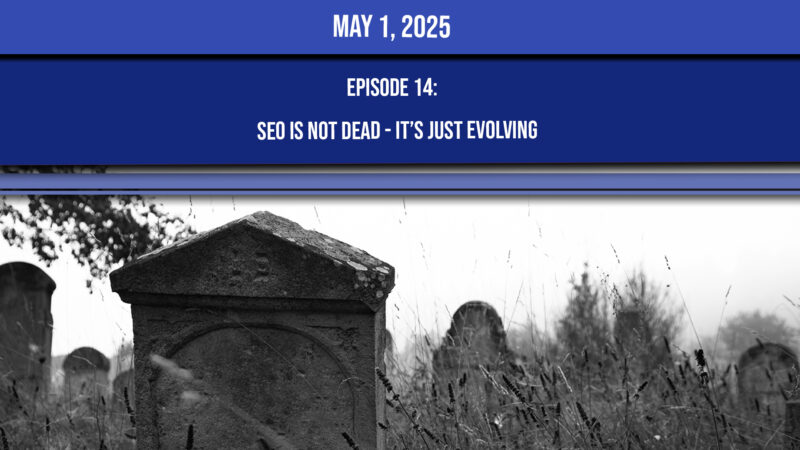Hey everyone, welcome back. Today we’re diving into one of the most overused – and misunderstood – statements in digital marketing:
“SEO is dead.”
Let’s be real. People have been saying this for over a decade. Every time Google rolls out a new update, or AI enters the chat, the headlines come rolling in claiming SEO is over.
But here’s the truth: SEO isn’t dead – it’s evolving. The tactics are shifting, expectations are higher, and the days of gaming the algorithm are long gone. But the core goal of SEO – helping people find the most relevant and helpful information – has never been more important.
So what’s actually changed, and what should you be doing differently today? Let’s talk about it.
The biggest misconception is that SEO is still about keywords and backlinks alone. That era is over. Today, it’s about relevance, user experience, and trust. Google’s algorithm has become incredibly sophisticated. It understands natural language, user intent, and even engagement signals that show whether someone found your content useful.
If you’re still relying on outdated tactics – like keyword stuffing, thin content, or spammy backlinks – then yeah, your SEO probably does feel dead. But if you’re playing by today’s rules, it’s still one of the most powerful marketing tools out there.
Let’s get into what’s actually changed and where you should be focusing.
First, content. It’s not just about writing blog posts anymore – it’s about producing resources that are actually better than anything else in the search results. Google doesn’t want to rank the 10th best article. It wants to rank the best. And the best content isn’t just longer – it’s more focused, more actionable, and more aligned with what the searcher actually wants.
To do that, you need to study your competitors. Look at who’s ranking in the top three for the keyword you’re targeting. What topics are they covering? How is their content structured? Are they using visuals, tools, or data you’re not? Use that insight to guide your own content – then build something even stronger. That’s how you compete in 2025.
Second, search intent is everything. Too many sites still treat keywords as checkboxes without considering what the user actually wants when they type that search. Are they looking for a quick answer? A product comparison? Step-by-step instructions? If your content doesn’t match the format and depth they expect, it won’t rank – no matter how optimized your title tag is.
Next, technical SEO is more important than ever. Page speed, mobile usability, site structure, structured data – all of it contributes to how Google crawls, indexes, and ranks your site. You can’t afford to ignore the technical foundation. A beautiful piece of content on a slow, unresponsive site won’t perform. Period.
Then there’s the changing shape of the search results themselves. Between featured snippets, image packs, People Also Ask boxes, and now AI-generated summaries from Google’s Search Generative Experience, the old “10 blue links” model is fading fast. Visibility today means showing up in multiple formats, across multiple parts of the page. If you’re not thinking about SERP features, you’re missing out on a big slice of traffic.
So what should you be doing right now?
Start by building better content – content that’s informed by what’s already ranking and improved through deeper insight, clarity, and usefulness. Make it easier to read. Make it more visual. Make it more comprehensive. That’s how you earn a spot on page one.
Don’t just chase keywords. Get serious about matching search intent. Think like the user – what are they really trying to accomplish? Then build your content around that, not just a term with high volume.
Make sure your site runs fast, looks great on mobile, and is easy to navigate. User experience and SEO are no longer separate conversations – they’re the same thing.
And diversify your traffic sources. SEO is powerful, but algorithm changes are inevitable. Build an email list. Grow your brand on social. Repurpose content into video. The more control you have over your audience, the less you rely on Google for survival.
Finally, stay curious. SEO is constantly changing. The people who succeed aren’t the ones who know everything – they’re the ones who keep testing, keep learning, and keep adapting.
SEO isn’t dead. But lazy, outdated SEO is. If you focus on helping users, building trust, and staying ahead of the curve, SEO will continue to be one of your highest ROI channels.
Thank you for being here. Please like this video, and subscribe to the channel for more SEO insights like this video. See you soon!

